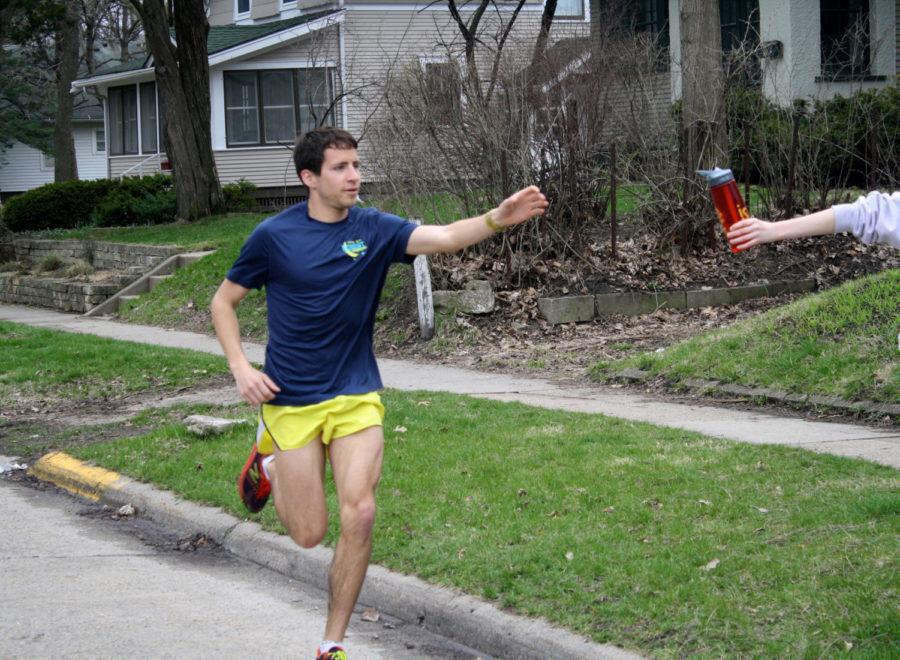Busting race day nutrition myths
Photo: Lauren Grant/AmesEats Flavors writer
Luke Demmel, senior in construction engineering and 1:09:04 half-marathoner, said it is important to hydrate during long-distance races but, depending on the weather, a runner can run 13.1 miles without a sip of water.
April 23, 2013
Racing season is upon us. There were 1.85 million half-marathon finishers in 2012, making the half-marathon the most popular race distance, according to Running USA.
There are many nutrition myths regarding how to properly fuel a half-marathon, but can these myths derail a personal best?
Myth No. 1: Carbo-load for a great race
“I don’t ever push carbo-loading,” said Meagan Burham, registered dietitian for the ISU Athletic Program.
Burnham recommended eating a well-balanced diet and eating enough carbs throughout your training all along instead of consuming tons the night before.
“Sixty percent of your calories for the day should be carbohydrates,” Burnham said. “Coupling it with lean protein is also important. You have to get the protein to support muscle growth.”
Burnham will be running the Drake Relays Hy-Vee Road Race half-marathon on April 28, 2013. Burnham doesn’t know exactly what her pre-race meal will be, but knows it will contain a lean protein and pasta.
Dani Stack, senior in dietetics and member of the ISU track and field distance team, agreed that carbo-loading isn’t necessary for half-marathons. Her pre-race meals generally consist of loads of veggies, a protein and some sort of grain.
“Personally, I believe in eating healthy all year round,” Stack said. “This will provide you with the most optimal training, which creates for better racing circumstances.”
Stack won the 2012 Mankato Marathon in a time of 1:17:26. When she is on the road and can’t cook for herself, she fuels up with a Chipotle Burrito Bowl the night before her races.
Luke Demmel, senior in construction engineering, doesn’t necessarily think what he eats the night before a race as much effect on him. Demmel’s half-marathon personal record is 1:09:04 at the Sturgis Falls race in 2011. The night before he ate a big bowl of pasta, but he doesn’t think it was the pasta that got him to his record.
“I just know I need fuel; I don’t really care if it’s noodles,” Demmel said.
Demmel has eaten everything from noodles to deli sandwiches to even consuming a round of beer and Zombie Burger the night before a race.
“It’s important to eat healthy all year round. Just eating something the night before the race doesn’t make sense to me,” Demmel said. “Your body is used to the nutrients it gets so I wouldn’t mix things up too much.”
Myth No. 2: Drink as much water as possible to avoid dehydration
Strenuous races such as a half-marathon do require hydration, however over-hydration can lead to hyponatremia, which can be fatal.
“It can happen in runners, but it’s an extreme scenerio. For most healthy people, that’s not something we worry about,” Burnham said. ”You’d have to make it a job to push that much water.”
Hyponatremia is drinking too much water, which dilutes the sodium in body fluids too much, causing an imbalance.
Sports drinks can help prevent hyponatremia and other electrolyte imbalances.
“Take a shot of Gatorade when you feel like you need a little boost and be consistent with water, taking a cup maybe every other station,” Burnham said.
Burnham recommended drinking sports drinks if working out for longer than 60 minutes.
Demmel said he rarely takes a cup of water from water stations during half-marathons, unless it’s a hot day.
“Sometimes in half-marathons I’ll take a sip, but usually I just dump it on my head to cool down,” Demmel said. “I can finish a half without being thirsty, depending on the weather.”
The most important thing regarding hydration is to be consistent.
“What I advise is to keep a water bottle with you all day, every day and hydrate consistently, so there’s not a need to have a big push for fluids just before the race,” Burnham said.
Stack said she drinks a lot of water in general and doesn’t drink water during a half-marathon unless it’s a very hot temperature.
“You don’t want to drink tons of water right before your race, because you will feel waterlogged and have that swishing sound in your stomach, and maybe even get side aches due to excess water in your stomach,” Stack said.
Myth No. 3: Eating during a race causes cramping
“For someone who is running for two hours you’re going to go through your stores and you’re certainly going to need to replenish. That’s where the Gatorade and the sports drinks can really help, because they’re quick-absorbing carbohydrates,” Burnham said.
Burnham said she also likes to eat energy gels and sports beans. “You don’t want to show up to the race and be trying these for the first time,” Burham said. “It can send your system into a bit of a tail spin.”
Quick-absorbing carbohydrates can cause gastrointestinal issues if a person’s body is not used to them.
Demmel hasn’t used gels during half-marathon distances, but he will use them during marathons or ultramarathons.
“Never in a marathon have I had food or gel issues,” Demmel said.
Burnham said she prefers to use gels during her half-marathon races.
“After 60 minutes I will eat food in any race,” Burnham said. “But a lot of people have different approaches to how and when.”
Stack said her training has taught her body to go a long time without needing refueling.
“I don’t eat or drink anything during my half-marathon. In training we do workouts and runs that are just as long, if not longer than a half-marathon, so I don’t really need to eat anything during the race,” Stack said.
Every person’s body is different and will have unique needs and react differently to foods. Burnham recommended being consistent and trying everything during training first.
“Trust your training,” Burnham said. “But food and nutrition plays the most importance day-to-day and in recovery from training. That ultimately is what will set you up for a great race.”











